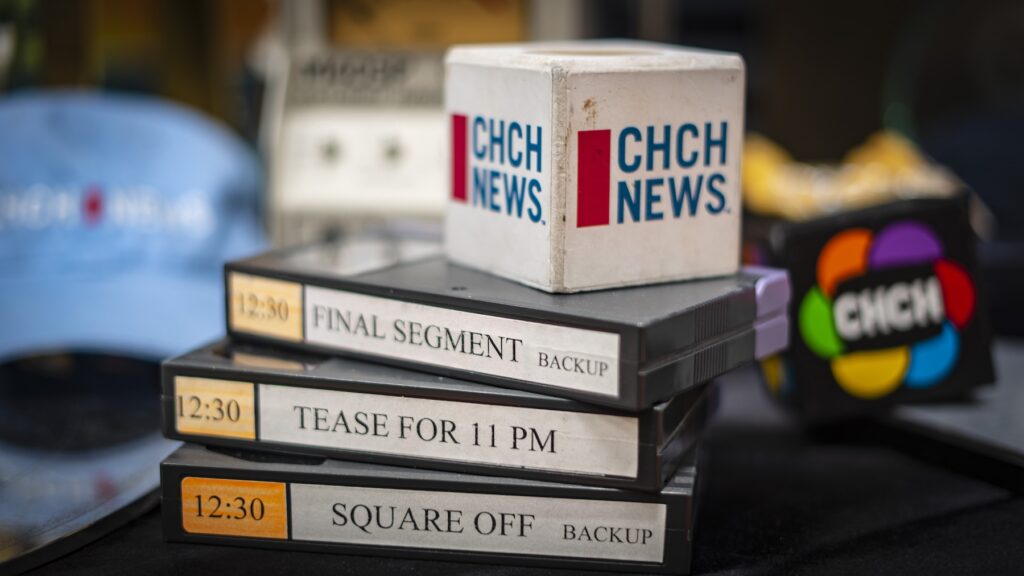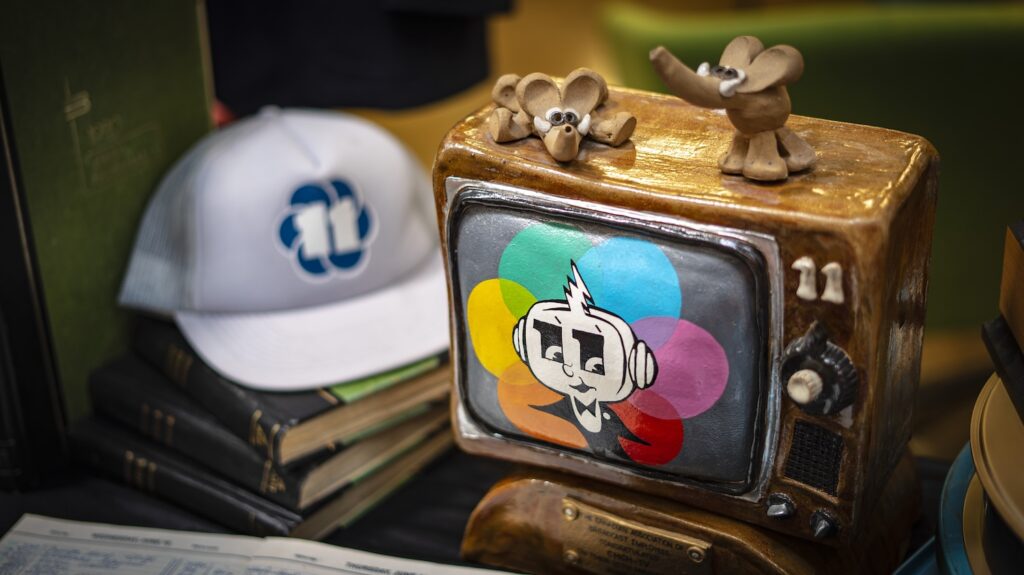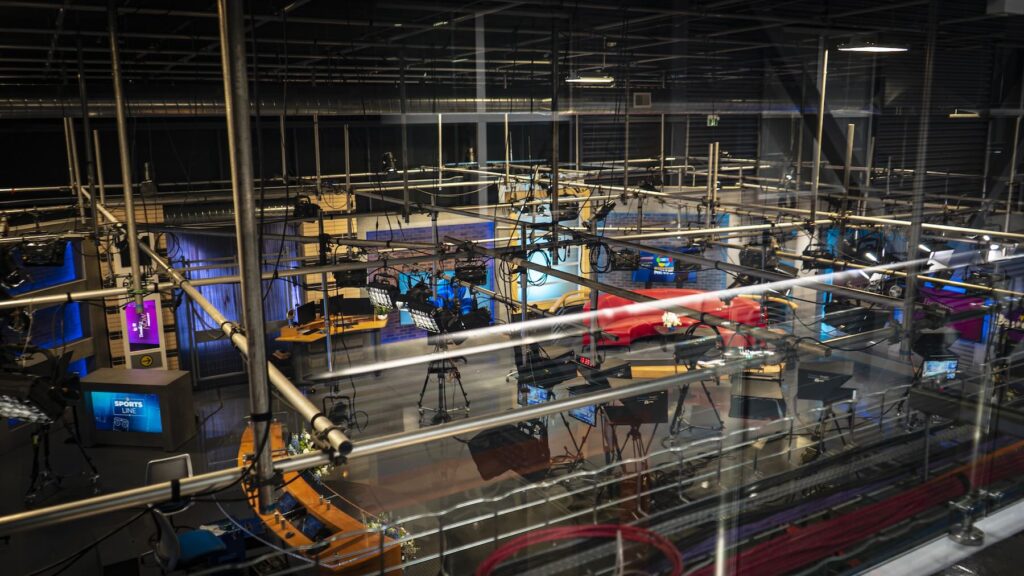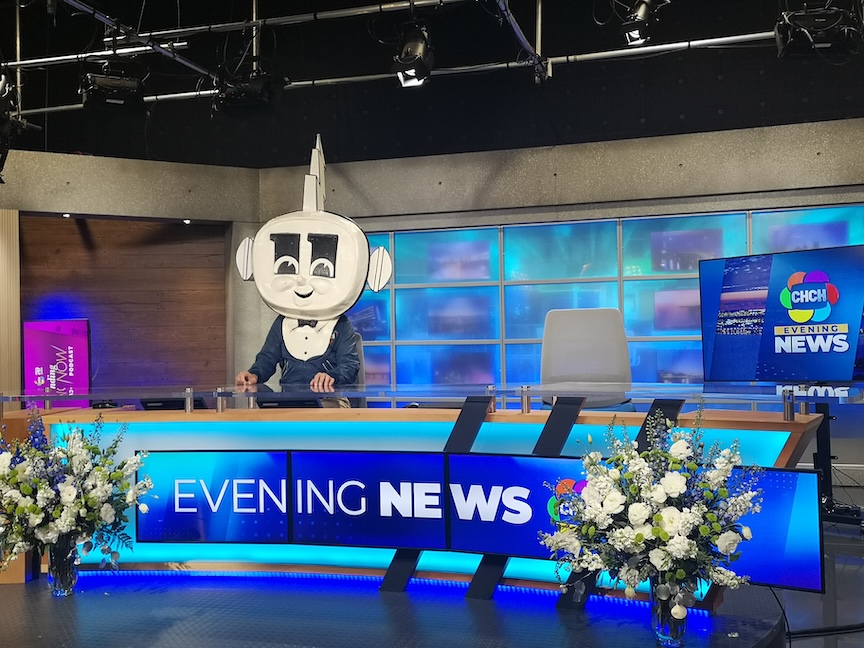An independent force

CHCH has been a pioneer throughout its 70-year history and is finding new ways to serve and inform its audience. Here, we explore the memories, talk to staff past and present and look to the future for Hamilton's independent station.
When CHCH-TV took to the airwaves from Hamilton on June 7, 1954 as a CBC affiliate, only about 20 per cent of Canadian households had a television set. That number ballooned to 80 per cent by 1960 and has climbed ever since.
And also ever since, the history of CHCH has been tightly interwoven with that of Hamilton and generations who grew up here (and well beyond), know the station as a cultural icon in the city. The station’s media personalities became household names over the years – Tom Cherington, Dick Beddoes, Connie Smith, Dan McLean, Paul Hendrick, Matt Hayes, Ken Welch and Annette Hamm among a much longer list.
Bill Lawrence, Steve Smith and Don Cherry became stars at CHCH and Martin Short even made his debut on the station.
CHCH was among 17 stations in the country to go live 70 years ago.
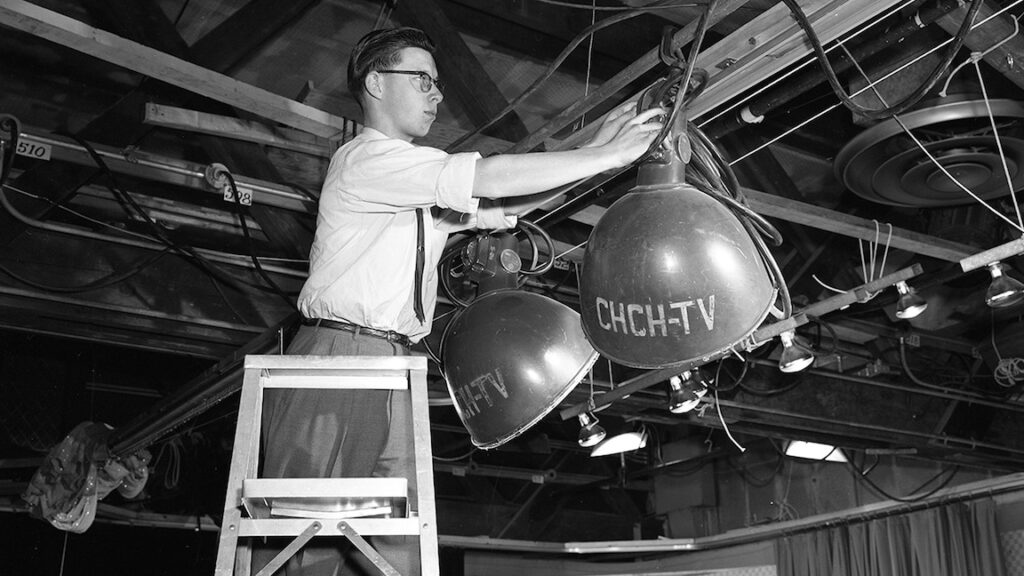
But in 1961, the station became the first and was for over a decade, the only television station in Canada not to be affiliated with any network.
Fast forward to today, an era where local stations have been swallowed up by networks or closed entirely, CHCH is the longest-running independent station and among just a handful of unaffiliated outlets left in Canada.
And the fact its parent company Channel Zero is investing in local news, adding news shows and podcasts, hiring journalists and recently invested in a large new headquarters is virtually unheard of these days.
A new home
CHCH moved into its new space on Innovation Drive in Waterdown in April 2022. It offers all the cutting-edge elements of modern studios, including a 360-degree anchor desk with fully adaptable lighting, a “Gate 11” sports desk constructed in the style of Hamilton’s Tim Hortons Field, a triple-monitor backdrop featuring a stylized skyline stretching from Toronto’s CN Tower through Hamilton City Hall to Niagara Falls’ Skylon Tower, another 12-monitor backdrop, and a portable control room to allow CHCH-TV to produce live on location for special sporting events and concerts.
Nods to the station’s history are everywhere – from a Hamilton Spectator front page in the green room from when the station launched in 1954, to the paper maché mascot head dubbed Mr. 11, to a sprawling mural that pays tribute to the station’s many personalities and milestones.
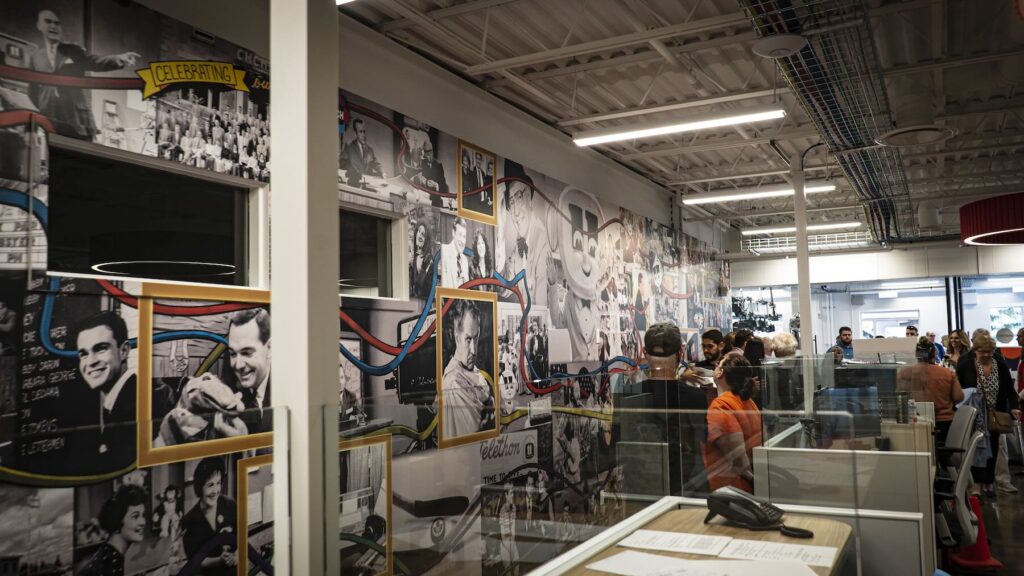
“We built this building from scratch during the pandemic,” says Channel Zero marketing manager Nick Bannard.
“Other newsroom were shrinking and people were being let go. This could have been abandoned but ownership carried on with it.”
When CHCH made the move from its Jackson Street West location in downtown Hamilton (now being developed into the 31-storey Television City condos), the station bid goodbye to its longtime home. The silver-wrapped TV studio that opened in 1983 – fondly nicknamed “Spaceship 11” at the corner of Caroline and Hunter streets – is now demolished. (The 172-year-old stone Southam House on the site is incorporated in the condo plan.)
From the Spaceship and the CHCH Telecentre on King Street West, CHCH produced untold thousands hours of local news, sports and entertainment programming, including Tiny Talent Time, professional wrestling, comedy show Smith & Smith, and Don Cherry’s Grapevine.
But shifting from analog to digital broadcasting requires robust fibre optics and open access to the skies for satellite signals and transmission towers. And parking was a worsening issue for employees.
At the new suburban headquarters, employees now work in an open-concept, grouped desk environment with splashes of colour and sleek indoor and outdoor kitchens that double as dining spaces and sets for cooking segments on CH Morning Live.

Tucked into a corner of the newsroom is a futuristic-looking Loop booth, which offers a sound-proof space for reporters to do interviews or just grab some silent time. In another recording booth, reporters can record the voice-overs for their news reports.
The new space allows for collaboration and multi-channel news content production, from email newsletters to podcasts, and from streaming from a YouTube page to traditional TV broadcasts, says Chris Fuoco, Channel Zero’s executive vice president of sales and marketing.
“We have a remarkable number of people that live stream our morning show every day. And I suspect a number of them are doing it on the GO train while they're commuting. You couldn't do that a few short years ago.”
A year-long party
The station celebrated its 70th birthday on June 7 with a party attended by many employees past and present and guests.
“We wanted to reward staff and alumni and celebrate them being a big part of the legacy of such a great brand, reward viewers for making us part of their daily lives, and reward advertisers for supporting their local station,” says Bannard.
The party kicked off a 52-week celebration, says Bannard, that has included a live studio audience drawn from contest winners for a CH Morning Live show.

“These were the biggest CHCH fans you could ever come across,” says news director Greg O’Brien. “It was amazing on a level I still can’t articulate. These are people who love us and appreciate us.”
A panel in May included numerous current and former CHCH journalists and technical staff sharing stories from past decades and insights into how the media has changed. Segments have been aired ever since and the event will be packaged into an hour-long special.
Other birthday elements include a special commemorative Top Story beer by Lake of Bays Brewing and a memorabilia deal with True Hamiltonian to sell official station gear.
The road to Channel Zero
There isn’t a media outlet around that hasn’t endured tough times and CHCH is no exception. It has gone through a number of ownership changes, a bankruptcy and the prospect of going black for good.
In the 1970s and 1980s, CHCH was one of the country’s most prominent syndicators of Canadian content, with many of its locally produced entertainment programs airing on television stations across Canada and occasionally internationally.
CHCH’s over-air signal was available to much of Ontario and in 1982, it became a superstation, providing its content to cable television providers in remote regions of the country that otherwise only had access to the CBC.
In 1990, Western International Communications bought CHCH and rebranded it is ONtv. With that shift, Hamilton took a back seat and ratings suffered. When Canwest bought WIC’s assets in 2000, the station was once again rebranded to CH. Soon after, Canwest entered a national and provincial licensing deal with the E! cable network in the U.S.
CH’s non-news programming became E! Ontario.
In February 2009, Canwest announced it was considering the possible sale or closure of CHCH and the company's other stations in the E! system. In response, a grassroots group fronted by then-CH personality Donna Skelly announced its intent to purchase the station and return to its local focus.
Canwest then revealed in its licence renewal application that CHCH was projected to lose nearly $30 million during the station's 2010 fiscal year. On June 30, 2009, specialty channel operator Channel Zero announced that it would purchase CHCH and CJNT-TV in Montreal from Canwest in exchange for $12 in cash and the assumption of liabilities.
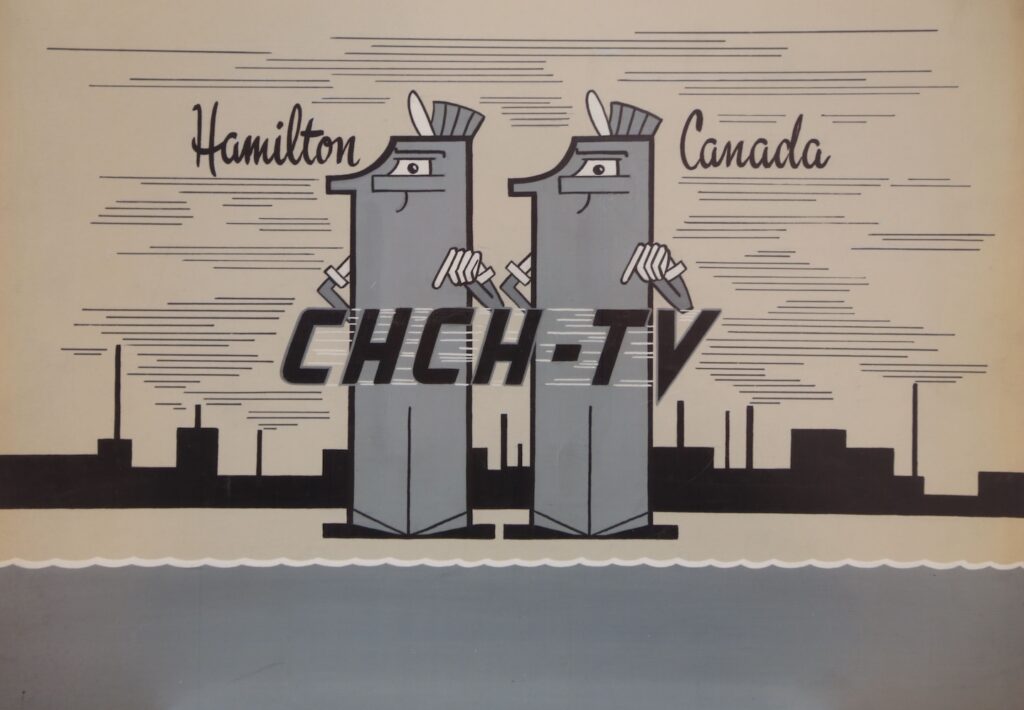
Channel Zero formed in 1999 and when it acquired CHCH a decade later “it was kind of a David and Goliath thing,” says Fuoco, who also co-owns Channel Zero along with Cal Miller and Romen Podzyhun.
“We were a small broadcaster prior to that and then we absorbed a very big and very important television station into our little fold … We put our brains together and started looking at this fantastic opportunity in Hamilton. I think a lot of other broadcasters had lost sight of just how fantastic a station CHCH was. We said, well, let's see if we can figure it out and find a way to save the station.”
Almost immediately, Channel Zero moved to reinstate the CHCH branding, including the vintage colourful logo that is reminiscent of a television. Its initial programming consisted of local newscasts throughout the day and movies at night. In 2010, it began airing American network television series in prime-time and made some modest additions to its local programming.
“We said that instead of running away from local and everything that's made CHCH great for 55 years at that point, we need to dive right back into it, head first, and that's where we were successful,” says Fuoco.
But that success hasn’t come easily. Trouble surfaced again one afternoon in December 2015 when Channel Zero abruptly ended its rolling news format and announced that Channel 11 L.P., the subsidiary that had produced CHCH's newscasts since 2009, had filed for bankruptcy. Company executives said the station was not shutting down but that a major restructuring of its operations was imminent.
CHCH's news output was slashed from 80 hours a week to 17.5 hours, including a morning show, newscasts at 6 p.m. and 11 p.m. and no weekend news.
With that devastating news, 165 people lost their jobs. The story is legendary in media circles. Staff were summoned to one of two rooms. One group was told their jobs were finished. The other group – 81 people – were offered new jobs.
“Those layoffs are still part of the story here,” says O’Brien. “And challenges still exist. National ad sales are soft but local ad sales are good. There are lots of people who believe in what we do and how we can help them reach our audience.”
CHCH is Channel Zero’s only broadcasting asset. (Montreal’s CJNT in Montreal was sold to Rogers in 2012 and is now part of the Citytv network). The company owns a film production and distribution arm, six specialty channels, including Silver Screen Classics, Rewind, and digital film distributor Ouat Media.
It also launched Junction Digital a few years ago that creates digital campaigns for local clients including podcasts, newsletters, social media content and videos.
The news must go on
O’Brien was founder of trade publication Cartt.ca, which covers the telecom, cable and television industries. He sold his stake to take on the news director post at CHCH in 2021, his first time running a newsroom.
“I’m a news junkie and an industry junkie. This is a great fit for me. I love this region so much and I have always been a huge fan of CHCH,” says O’Brien, who moved to Hamilton in 1994.
“People have relied on this station for decades and we are so proud of that.”
He oversees four news shows in the CHCH lineup: CH Morning Live, news broadcasts at 6 p.m. and 11 p.m., and Trending Live, a popular news talk show that covers local, national and international stories.
“We serve Hamilton, Burlington, Oakville, Haldimand-Norfolk, Brantford and Niagara. That’s 1.5 to 1.7 million people. It’s a welcome challenge to stay on top of what’s important to our viewers,” says O’Brien.

Altogether, CHCH brings in 2.4 million viewers a week and many more access news through livestreaming or CHCH’s various social media channels.
The diversification of platforms reaches new audiences but also allows advertisers with smaller budgets to access CHCH products.
O’Brien acknowledges the ongoing challenges of being in local media and having to do more with less. (During the writing of this story, news breaks of another devastating hit to the media landscape – the sudden loss of 900 CHML.)
“We have to focus on the role we serve in informing the public. Journalism isn’t a job, it’s a calling. It’s also a fun way to make a living because you’re telling stories and making a difference.”
About 40 people work on the news side at CHCH, along with about 35 people in operations.
“Some people cross all four shows in some way. Cross-collaboration is very common here,” says O’Brien.
Technology has streamlined the reporting process and journalists are cross-trained, too. They can work as reporters, fill in as anchors and get behind the microphone on a podcast, says Fuoco.
All of that allows for flexibility and maximizing a small team, he says.

It’s basically a 24-hour operation. An early editor arrives at 1 a.m. to sort through what’s happened overnight and get to work on the news lineup for CH Morning Live. Anchors Annette Hamm and Tim Bolen and show producers start at 3:30 a.m.
From there, the day takes off, with the digital team, web writers, and reporters, producers and editors for the news broadcasts. There are several meetings throughout the day to make sure stories are coming together and to adjust plans when they aren’t.
Diversifying and focus
About a year ago, CHCH started producing podcasts, including Sportsline with long-time sports anchor Bubba O’Neill and Newsmakers, which checks in with local politicians, artists, sports figures and journalists.
“We know that our audience wants to access information in a variety of ways, so we are focused on diversifying our platforms and widening the net for consumption,” says O’Brien.
In a time of newspapers closing down, Channel Zero is breaking in there, too.
The Brant Beacon, serving Brantford, Brant and Six Nations, is now three years old. In that time, the digital platform has produced 3,500 stories, some in collaboration with CHCH journalists.
“We can’t get to every story but these smaller local stories, like what’s happening at the library or a charity bake sale, they matter to their communities,” says O’Brien.
Channel Zero is growing the platform, and O’Brien, who worked as a consultant on the Beacon before taking his current job, says the plan is to bring the model to other communities.
“We are pretty proud of what we've done there in a short period of time,” says Fuoco. “We're always evaluating and looking at opportunities. I mean, that's the nature of an entrepreneurial business, which is kind of in our DNA. That's what drew us to CHCH, and we saw that as an opportunity, when maybe others didn't.”
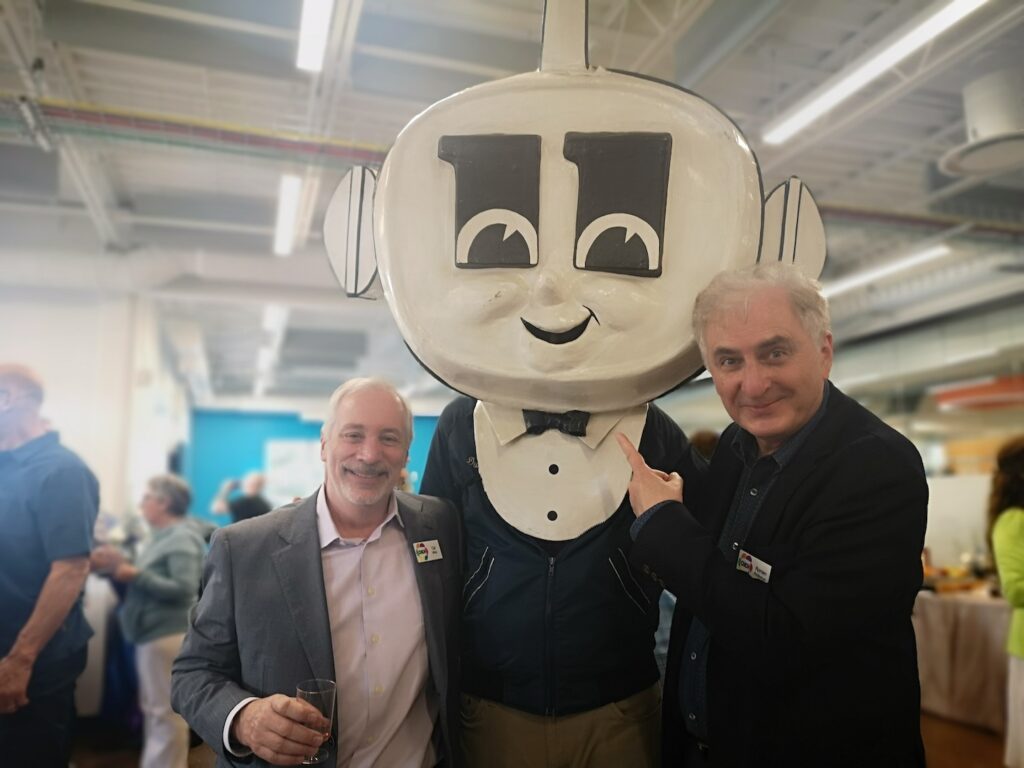
While Fuoco wouldn’t close the door on producing a drama or comedy, that carries risk in today’s market. Channel Zero is focused on what it does well.
“In the 70s and 80s, you flipped on the TV and you had maybe four or five options or if you had a cable subscription or a powerful enough antenna, you might be able to pick up a couple of stations out of Buffalo. So, an independent station in southern Ontario could stand out in that market and grab an audience. Fast forward to today, and between, a 200-channel television subscription world, everything that's available on the internet, countless number of streaming services, there is a lot of competition for your attention.”
The key is finding a niche that sets you apart, says Fuoco. For CHCH in 2024, that’s local news and news talk, movies, prime-time simulcasts of U.S. programming, and a daytime retro block of classic comedies and dramas (I Love Lucy, Dick Van Dyke, The Love Boat, Dynasty among them) that Fuoco calls comfortable favourites.
“There was immediate traction with that. People started asking for other shows. The outpouring of suggestions from our audience was great, to the point where we're retro programming from basically 10 o'clock in the morning until 5:30 at night. It’s found a nice, loyal audience and stands us apart from other broadcasters.”
If there’s one thing that’s clear over 70 years, it’s that when Hamilton’s station has strayed from its local focus, it has lost its way. From the weather, to high school sports to municipal politics, local still rules, says Fuoco.
“CHCH is a place to see the community, to see businesses, to see restaurants and fun events and festivals and theatre and sports. It’s a place for people to see their community, and that's what the station's always done, I think, and I don't think that changes in the 70 years ahead of us.”
For his part, O’Brien believes that being a trusted source of news will only grow in value. As local media outlets covering city hall, police services and other civic institutions disappear or drastically shrink in size, experts predict that as much as 90 per cent of content on the internet by the end of 2025 will be generated with the help of artificial intelligence.
“Generative AI is going to make a mess of the internet and people won’t know what is real and what isn’t unless they seek out credible media sources,” he says.
“Every day, we ask questions and seek out the facts and try to find the truth. So I think in the future, CHCH will hit its stride even more than it does now. All we can do is to keep doing what we do and prove our value every day.”
70 years of memories
Seventy years pack a lot of change and memories and CHCH has plenty of stories to share from its history since it took to the airwaves on June 7, 1954.
The station has gathered archival footage, interviewed past CHCH personalities, and hosted a media panel of current and former staff.
In that wide-ranging panel discussion, you’ll hear stories of CHCH producers racing through Toronto to take video tape from Queen’s Park up to the top of the CN Tower to send it by microwave transmitters to the station’s tower on the Stoney Creek Mountain in time for the 6 p.m. news.
You’ll hear longtime anchor Connie Smith talk about the time she was starstruck by Michael Douglas and weatherman Brian Wood share the time he was doing a live hit in downtown Hamilton just after the Ticats won the Grey Cup and got tackled from behind by a guy dressed up as a gorilla.
In an interview with now-retired colleague Bob Cowan for the 70th anniversary, CH Morning Live anchor Annette Hamm shared that when she started in the newsroom, there were ashtrays and electronic typewriters on the desk.
She started her career as a 19-year-old Mohawk College student, monitoring and recording news stories coming in by satellite transmissions. From there, she transitioned to a reporter job, covering general assignments and then crime.
“I remember when we first got computers we didn’t even get our own computers. We had to share at a desk with someone else.”
Hamm is the third-longest-serving employee at the station, behind Sue Vidakovic on the sales creative team and camera operator Duane Worth.
HAMILTON CITY Magazine talked to Smith, the station's first ever woman to anchor the weekday news, to Worth about his 43-year career and to director/switcher Laura Brody, who followed in her father’s footsteps right to CHCH.
‘Front row seat to history in the making’
Connie Smith spent 32 years telling the stories of Hamiltonians at CHCH.
Smith, who was born in Hamilton and raised in Burlington, graduated from Mohawk College in broadcast journalism. After two radio stints and a reporter post at Barrie’s TV station, Smith was hired to be a general assignment reporter at CHCH in 1976.
“We were in the old house on Caroline Street at the time. It was a smoky newsroom with typewriters and an old film processor in the back room. And at the time, there was a half hour show at six, and a half hour newscast at 11.”
Smith was part of the news team as programming grew throughout the 1980s and 1990s. The station expanded its newscasts, added an hour of news at noon and Smith hosted a weekend show called Straight Talk.
She became the station’s first female anchor of the weekday news.
The team moved into a brand new studio building on Jackson Street and added new shows and specials. She got to travel the country covering national and international stories, interviewed prime ministers, CEOs and celebrities, and was moved to tears over local stories of tragedy, triumph and resilience.
“It was Tom Cherington who taught me you can ask the toughest questions in the world, but if you ask with dignity and respect, people will talk to you. And I never forgot that.”
She was on the air for hours in the wake of the 9/11 attacks and co-hosted CHCH’s telethons for McMaster Children’s Hospital for close to 20 years.
“I used to tell my students that you have a front row seat to history in the making. You're right there, and you can play a role in it. You can play a role to make it better, to get the facts straight, and to try to push the story forward with hope and possibility.”
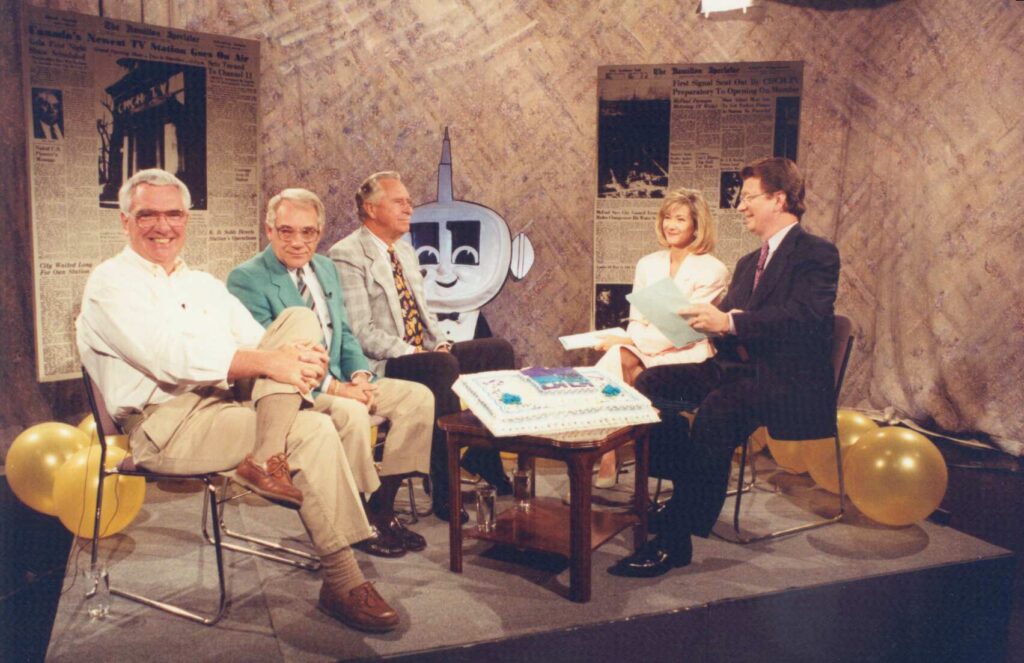
Smith was rocked by the way her time at the station ended, when suddenly, in late 2008, she learned her anchor job was being eliminated when then-owners Canwest cut staff and programming. Her longtime co-anchor Dan McLean also left the station after 37 years.
“The day I left CH was probably one of the most traumatic days of my life,” says Smith. “I didn't see it coming, and I was I was pretty messed up for a while, but then you got get over it, and you move on, and you realize it's a new chapter. And it happens to a lot of people. They say you can't take it personally. Of course, you take it personally, but you got to leave the bitterness and the anger behind and just kind of move forward and look back on the positives.”
They include meeting her husband, director and producer Dave Wilson, and so many of her closest friends.
Smith says she was pleased to be part of the 70th anniversary celebration and it was a “cathartic experience” to look both back and forward to CHCH’s role in the community.
“It is a significant milestone,” she says, “and it's a very important part of the community. It's changed a lot, you know, as a result of many factors, and constant changes of ownership, where ownership was farther and farther disconnected from the community,” she says.
Meeting the young reporters and learning how the job has changed, was eye-opening, says Smith. They were eager to hear the advice and stories of the veterans.
“I am grateful to have been at the station in the golden years.”
Smith says CHCH creates important human connections while being a local, credible news source.
“I know I want to hear a human being, and I want to hear that voice. I want to know that voice. I want to know who they are, their credentials, so that I know there's someone to trust.”
Smith is fiercely proud of the contributions CHCH made to the community and it’s heartwarming when people approach her to say hello.
Since leaving CHCH, Smith has worked as a freelance broadcaster, host and MC, a journalism professor, a columnist, and a consultant, while volunteering on a number of boards.
“I was blessed to have worked at that station for those 32 years. Absolutely blessed to have worked there and I wouldn't trade them for anything. They were wonderful, wonderful years,” she says, crediting her time at CHCH for the credibility and community connections to carry on doing the work she loves.
“I just hope for the best, and I hope for good journalism and good local journalism, to still find a place.”
'Heart and souls'
Camera operator Duane Worth has been a fixture behind the lens for 43 years. He landed a summer job at CHCH in 1981 on a production crew, working some of the great shows of that era.
Long before Canadian Idol was Tiny Talent Time and before America’s Got Talent was CHCH’s New Faces. Before the celebrity chefs of today was singing chef Pasquale Carpino. Before the iconic Let’s Make a Deal, Monty Hall was shooting Split Second in Hamilton.
Before Red Green became one of Canada’s most beloved characters, he was launched in a short segment on Smith and Smith in a CHCH studio.
“(CHCH founder) Ken Soble was brilliant. We were independent and we had to have shows on the air. We couldn’t afford to buy the stuff, so we made it,” he says.
“We had three crews that worked on all those shows. It was a very busy time. You would set up the studio, do the lighting and then we would shoot five shows a day.”
They were shot in the CHCH Telecentre on King Street West, which is now boarded up, or the CHCH studio at Jackson Street, which is now demolished to make way for condos.
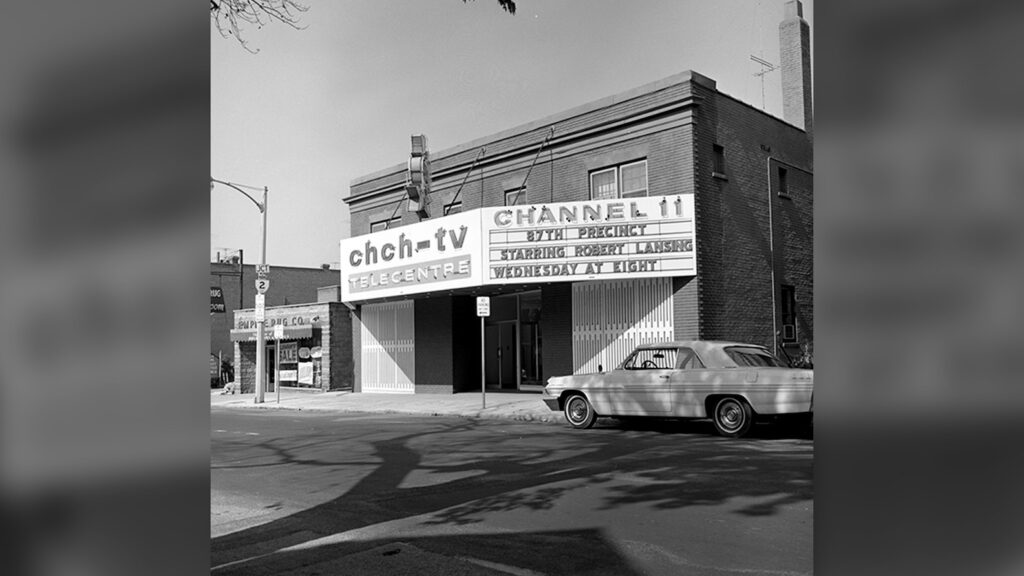
In those days, the crews also worked the University Game of the Week, Leafs on 11, which broadcast the midweek game in Toronto, and Maple Leaf Wrestling from the Brantford Civic Centre.
“We would tape that show and the producers would come in the next day and edit it into a one-hour show. We would make 20 copies, and they would courier it across Canada to the different stations when they would air it on Saturday.”
When Worth joined CHCH, operations were located in the 1850 Pinehurst mansion on Jackson Street. The studio was in a former bedroom. Three older homes across the street housed the Tom Cherington Show, the newsroom and the accounting office.
“I was proud of all that Canadian programming. We put our heart and souls into everything we did.”
Worth eventually became a studio camera operator (a job that is now done robotically) before becoming a news camera operator about 25 years ago. That was the time that in-house production of non-news shows ended.
Most of his crew colleagues – about 30 people – went freelance and many of them are still working today on Blue Jays and the Leaf games for Dome Productions.
But Worth’s family was young and he wanted to stay close to home, so he jumped at the chance to replace a retiring camera operator. When he started, cameras used film that had to be developed in the darkroom. There were eight cameras out on a day shift in those days. Now there are two and many video journalists are shooting with smartphones.
Technology has changed everything. A live hit used to require a satellite truck but now the camera is plugged into a small transmitter that uses a cell signal to connect to the studio. Editing that once required a suite now needs only a laptop.
Though he says he doesn’t know how, Worth has survived five layoffs at CHCH. He’s proud of his lengthy career. Even though he’s still working, he’s part of an active group of CHCH retirees that get together periodically to reminisce.
“We didn’t realize how much fun we were having back in the day. At the time we were working hard, but we really did some magical stuff back then.”
He’s been part of the team interviewing huge stars, including Robert De Niro, Jane Fonda and Bill Murray, and been a crew member on six Olympics, including Nagano, Torino, Salt Lake, and Vancouver. He’s also helped to broadcast untold numbers of Maple Leaf, Buffalo Sabres, and Montreal Expos games, as well as Canadian Opens.
One of his favourite things to do now is to shoot beautiful footage of the city to run credits over at the end of the 6 p.m. news on Fridays. When he wasn’t seeing his grandkids during the pandemic, he started putting himself in that footage every week. It has become a special family moment.
“My grandkids watch it, and they jump up and down when they see me.”
‘I love coming to work’
CHCH is a family business for Laura Brody. She’s a director/switcher on CH Morning Live, who cues the anchors, rolls video and posts graphics. That was once two jobs but technology in the new CHCH headquarters in Flamborough combines those roles.
“I feel like CH makes people feel at home. It’s a family environment here. You feel welcome when you're here. And I think the viewers feel welcome watching, too.”
She joined the station as a part-time production assistant in 2008 and was hired full-time in 2011. Four years later, she became a director. Her father Mark Brody worked at CHCH for 37 years, mostly as a floor director. He met Laura’s mother at the station, too, when she worked in payroll.
“I grew up around the station, and I don't know if that's what made me want to do this, or if it was just in me,” says Laura Brody. “I don't know, but I wanted to go into broadcasting.”
Father and daughter worked together until Mark was laid off in December 2015. He continues to work in the industry as a freelance floor director.
Laura Brody is so invested in CHCH that while a student in Mohawk College’s broadcasting program she was part of a team that produced a documentary that explored the potential shutdown of the station and a grassroots fundraiser to save the station that preceded Channel Zero buying it.
And then, in a full circle moment, Brody directed the media panel for the 70th anniversary. She loved hearing from all the people who have contributed to CHCH over the years, on both the news and entertainment sides.
The company’s investment in CHCH is proof that “local news has a future,” says Brody.
“I love coming to work. I get up at 4 a.m., so I dread that. But once I’m here, the energy that's in here kind of just takes me right through the show.”

Fascinating CHCH facts
- CHCH began broadcasting on June 7, 1954 as a CBC affiliate. In 1961, it became Canada’s first independent station.
- The station was founded by Ken Soble, owner of 900 CHML, which ceased broadcasting in August.
- Soble, who was also a leader in the urban renewal movement in Hamilton in the 1960s, led a plan to build a new national network around CHCH as the flagship. That didn’t come to fruition, but was the basis for the formation of the Global network in 1974.
- CHCH was the first station to employ virtual sets and if anchors wore blue, they would disappear into the city skyline.
- In 2011, Channel Zero announced a distribution deal with 20th Century Fox that gave CHCH the rights to show first-run exclusive broadcast movie premieres, most notably Avatar, in May 2012. CHCH broadcast the director’s cut of the film not shown in theatres. Other debut titles included Crazy Heart, Taken, and X-Men Origins: Wolverine.
- CHCH’s old transmitter on First Road West in Stoney was demolished in March 2024 after being replaced by a new transmitter located on Highway 5 near Millgrove Side Road in Dundas that started transmitting in November 2023.









